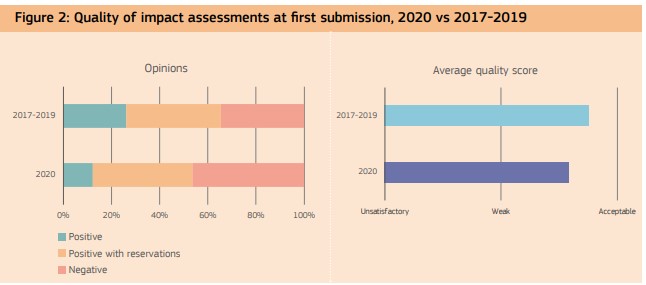The quality of the European Commission’s impact assessments decreased in 2020. The initial rejection rate was 46 %. That’s the conclusion by the EU’s Regulatory Scrutiny Board (RSB) in its annual report.
The RSB is the College of Commissioners’ independent in-house advisory body on quality of impact assessments and evaluations before proposals go out the door. The RSB’s stats on the quality of impact assessments in 2020 are very clear:

(Source: Regulatory Scrutiny Board)
Why did the quality of impact assessments decrease?
Time pressure is the main answer. The RSB says it is primarily because of the ambitious political deadlines to deliver on the new Commission’s priorities.
Several weaknesses were identified because of this: a lack of coherence, failure to consider policy options and the final choice of the preferred policy options were found to often be insufficiently based on analysis in the impact assessments etc.
The last weakness raises concerns. The RSB state that the policy options considered in impact assessments tended to “focus only on the preferred (political) choice, without including alternate ones supported by the main stakeholder groups” (See page 20 of the annual report). The RSB also found that problem definitions were predetermined by the preferred policy options. These are strong criticisms of the Commission’s commitment to evidence-based policymaking.
Covid-19 has had its impacts on quality. The RSB regularly asked for better consideration of the crisis in the impact assessments from March 2020 onwards.
What are the implications of the decrease in quality?
At a practical level, the initial negative opinions by the RSB on average resulted in quality improvements in the subsequent versions of impact assessments. So, the system should be working, and better EU rules should be the result.
Even if the RSB gives the thumbs down to an impact assessment in its final review, the Commission can still decide to move ahead. The degree to which that happens will be interesting to follow especially since there is perhaps even more pressure on the Commission services to roll out proposals in 2021 than in 2020.
The question is then whether the services will have room to make improvements (and potentially delay on delivering the political programme) or whether the Commission will proceed despite negative RSB opinions?
In any case, if the trend of negative opinions by the RSB during their first scrutiny continues, it may result in delays as the Commission launches numerous new proposals over the rest of 2021.
How will the Commission address this trend?
The Commission will soon present its Better Regulation Communication which could include tools to improve the 2020 record.
The Commission needs to give answers to how new better regulation commitments are to be implemented. It includes the integration of the ‘one in-one-out’ principle, foresight analysis, the Green Deal’s ‘do no harm’ principle and the sustainable development goals.
For instance, the RSB’s report highlights the challenge of putting ‘do no harm’ into practice. The proportion of impact assessments that consider environmental impacts increased to 49% but only 44% of all scrutinised reports examined the consequences of initiatives for climate change. Far less looked at other environmental pollution, biodiversity and circular economy. These impacts may not be relevant to all initiatives, but a rigorous analysis would likely be needed to demonstrate this.
In any case, the updated Better Regulation Guidelines need to be backed up by a real political commitment to improve on the situation. Time will tell if this materialises.
Find Out More
-
Generative AI is changing the search game
May 8, 2025


